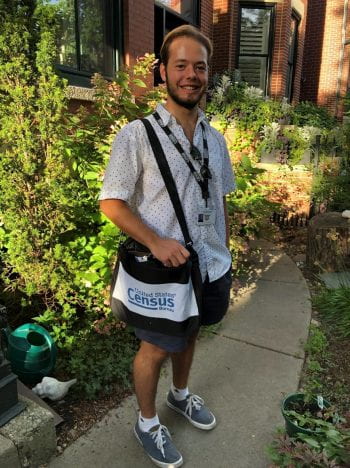“As a college student, completing the census is a way for you to give back to St. Louis beyond the time you spent at WashU.”

Sophomore Otto Brown spent part of his summer as a census worker. Knocking on doors in his own neighborhood gave him a new perspective and appreciation for the work that goes into a successful enumeration. He was surprised at what he learned during the process. “I’ve learned a lot more about my neighborhood than I knew before. There were things I never noticed. Like the fact that there are way more apartments than I realized.” And he found out how many people no longer know their neighbors, sharing that a successful enumeration “relies on a fundamental assumption about communities that may not be true anymore.”
When he unexpectedly returned home in March, he was looking for a way to get a job and make an impact. “There was a sign recruiting census workers in my neighborhood, and the pay was pretty good,” Brown shared. So he put in an application with a friend. He assumed work would begin in April when door-knocking was scheduled to begin. However, due to the lockdowns across the nation, the census delayed the original timeline and door-knocking began in August.
“We did training modules online, but it’s a lot different coming face-to-face as the person asking all of the questions. Some people do not want to give out their information. But eventually, I got into a groove and it became fun,” he said. In his hometown in Chicago, Illinois, he was able to walk the streets close to DePaul University near which his parents own a home. There you find a mix of homeowners, renters, and college students, many of whom had gone home due to the pandemic.
The enumeration process has faced a number of unforeseen hurdles and barriers to achieving an accurate count. Brown expressed that a lot of young people are not even aware that the census is happening, and getting people to share their information can be a challenge. “Explaining things through a mask was hard. It’s a lot less personal; nobody can see you smile. Everything you share is protected by federal law,” said Brown. “But even if you tell people that, they don’t always believe it.”
One fun thing about being a census worker is the community that it forms. “There’s a whole online subreddit dedicated to census enumerators,” Brown shared. “It’s a really neat community to be a part of. You get to find out how people are doing all across the country. I go on there probably once a day. You hear things like, ‘This one woman had some extra crab so she gave me crab for tonight’s dinner and it’s in the back of my car in a cooler right now.’ It’s a way of feeling connected during this pandemic reality.”
When asked how he would motivate his peers to complete the census, he replied, “It’s the easiest way to make an impact. It takes ten minutes to fill it out and helps with funding for ten years. It also determines congressional representation. So many people focus on voting, which is really important, but if the representation is skewed because of the census, you won’t be represented accurately.”
The self-report process ends on September 30. For those WashU students and recent graduates who were living off-campus in the spring semester, it’s not too late to fill out the form. Students should complete the census as if they were in St. Louis on April 1st. You can find out more information on our website or 2020census.gov.
When asked if he would do it again he responded, “I think my capacity for this is eight weeks every ten years.”
Article by Colleen Smyth